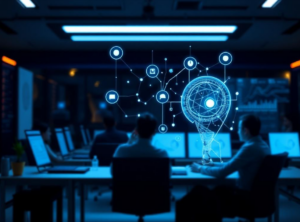How Artificial Intelligence is Shaping the Future of Work in the US
The Impact of AI on Job Automation and Reskilling in the US Workforce
Artificial intelligence (AI) has been a buzzword in the tech industry for quite some time now. But its impact is not limited to just the tech world. AI is rapidly shaping the future of work in the US, and its effects are being felt across various industries. From job automation to reskilling, AI is changing the way we work and the skills we need to thrive in the workforce.
One of the most significant impacts of AI on the US workforce is job automation. With the advancement of AI technology, machines are becoming more capable of performing tasks that were previously done by humans. This has led to concerns about job displacement and the fear of AI taking over human jobs. According to a report by McKinsey, up to 800 million jobs worldwide could be automated by 2030, with the US being one of the most affected countries.
The industries that are most at risk of job automation include transportation, manufacturing, and retail. For example, self-driving cars are expected to replace millions of truck drivers in the US. Similarly, robots are being used in manufacturing plants to perform tasks that were once done by humans. And with the rise of e-commerce, many retail jobs are being replaced by automated systems and robots.
However, it’s not all doom and gloom. While AI may lead to job displacement, it also creates new job opportunities. As machines take over routine and repetitive tasks, humans can focus on more complex and creative work. This means that the demand for jobs that require critical thinking, problem-solving, and emotional intelligence will increase. In fact, a report by the World Economic Forum predicts that AI will create 58 million new jobs by 2022.
But for these new jobs to be filled, the US workforce needs to be reskilled. With the rapid advancement of technology, the skills needed for jobs are constantly evolving. This means that workers need to continuously update their skills to remain relevant in the job market. According to a survey by the Pew Research Center, 87% of workers believe that it will be essential for them to get training and develop new skills throughout their work life to keep up with changes in the workplace.
The good news is that the US government and various organizations are taking steps to reskill the workforce. The American Workforce Policy Advisory Board, established by the Trump administration, is working to develop strategies to help workers reskill and adapt to the changing job market. Companies like Amazon, Google, and IBM are also investing in programs to train and reskill their employees in AI-related skills.
But it’s not just about reskilling the current workforce. The education system also needs to adapt to the changing job market. Schools and universities need to incorporate AI-related skills into their curriculum to prepare students for the jobs of the future. This will not only benefit the students but also the economy as a whole.
In conclusion, AI is undoubtedly shaping the future of work in the US. While it may lead to job displacement, it also creates new job opportunities. The key is for the workforce to adapt and reskill to meet the demands of the changing job market. With the right strategies in place, AI can be a powerful tool for economic growth and job creation in the US.
The Role of AI in Enhancing Workplace Productivity and Efficiency

Artificial Intelligence (AI) has been a buzzword in the tech industry for quite some time now. It has been hailed as the future of work, with the potential to revolutionize the way we work and live. In the United States, AI is already making its mark in various industries, from healthcare to finance. But perhaps one of the most significant impacts of AI is its role in enhancing workplace productivity and efficiency.
One of the main reasons why AI is gaining popularity in the workplace is its ability to automate tasks that were previously done by humans. This means that repetitive and mundane tasks can now be handled by machines, freeing up employees to focus on more complex and creative tasks. This not only increases productivity but also allows employees to use their skills and expertise in a more meaningful way.
AI is also being used to streamline processes and make them more efficient. For example, in the manufacturing industry, AI-powered robots can work alongside humans to increase production speed and accuracy. This not only reduces the time and effort required to complete a task but also minimizes the chances of errors. In the healthcare industry, AI is being used to analyze medical data and assist doctors in making accurate diagnoses. This not only saves time but also improves patient outcomes.
Another way AI is enhancing workplace productivity is through data analysis. With the vast amount of data being generated every day, it is impossible for humans to analyze and make sense of it all. AI, on the other hand, can quickly process and analyze large datasets, providing valuable insights and predictions. This allows businesses to make data-driven decisions, leading to increased efficiency and productivity.
Moreover, AI is also playing a crucial role in improving customer service. With the rise of chatbots and virtual assistants, businesses can now provide 24/7 customer support without the need for human intervention. These AI-powered tools can handle simple customer inquiries and complaints, freeing up human employees to focus on more complex issues. This not only improves customer satisfaction but also allows businesses to handle a larger volume of customer interactions.
In addition to enhancing productivity, AI is also helping businesses save costs. By automating tasks and streamlining processes, businesses can reduce the need for human labor, which can be costly. This is especially beneficial for small businesses that may not have the resources to hire a large workforce. With AI, these businesses can still compete with larger companies and increase their productivity without breaking the bank.
However, with the rise of AI, there are also concerns about job displacement. Many fear that AI will replace human workers, leading to a rise in unemployment. While it is true that some jobs may become obsolete due to AI, it is also creating new job opportunities. As AI continues to evolve, there will be a growing demand for professionals who can develop, maintain, and improve AI systems. This means that individuals with skills in data analysis, programming, and machine learning will be in high demand in the future job market.
In conclusion, AI is undoubtedly shaping the future of work in the US, particularly in terms of enhancing workplace productivity and efficiency. By automating tasks, streamlining processes, and analyzing data, AI is allowing businesses to work smarter and faster. While there are concerns about job displacement, it is also creating new job opportunities and driving economic growth. As AI technology continues to advance, it is essential for businesses and individuals to adapt and embrace this new era of work.
Ethical Considerations and Regulations for AI Implementation in the US Job Market
Artificial intelligence (AI) has become a buzzword in recent years, with its potential to revolutionize various industries, including the job market. As AI technology continues to advance, it is crucial to consider the ethical implications and regulations surrounding its implementation in the US job market.
One of the main ethical considerations for AI in the job market is the potential for bias. AI systems are trained using data, and if the data is biased, the AI will also be biased. This can lead to discrimination in hiring and promotion processes, perpetuating existing inequalities in the workforce. For example, if an AI system is trained on data that shows a preference for male candidates, it may overlook qualified female candidates for job opportunities.
To address this issue, companies must ensure that the data used to train AI systems is diverse and representative of the population. Additionally, regular audits and evaluations of AI systems can help identify and correct any biases that may arise. It is also essential for companies to have diverse teams working on AI development to prevent unconscious biases from influencing the technology.
Another ethical consideration is the potential impact of AI on job displacement. As AI technology becomes more advanced, it has the potential to automate many tasks currently performed by humans. This could lead to job loss and displacement, particularly in industries that rely heavily on repetitive tasks. While AI may create new job opportunities, it is crucial to consider the potential impact on those who may lose their jobs due to automation.
To address this issue, companies and policymakers must work together to develop strategies for retraining and upskilling workers whose jobs may be at risk of automation. This could involve investing in education and training programs to equip workers with the skills needed for jobs that require human interaction and creativity, which are less likely to be automated.
In addition to ethical considerations, there are also regulations in place to ensure the responsible use of AI in the job market. The Equal Employment Opportunity Commission (EEOC) has guidelines in place to prevent discrimination in hiring and employment practices, which also apply to the use of AI. Companies must ensure that their AI systems comply with these guidelines to avoid legal repercussions.
Furthermore, the use of AI in the job market raises concerns about data privacy and security. AI systems collect and analyze vast amounts of data, including personal information, which must be protected to prevent misuse or unauthorized access. Companies must adhere to data privacy laws, such as the General Data Protection Regulation (GDPR) and the California Consumer Privacy Act (CCPA), to ensure the responsible use of AI and protect individuals’ privacy rights.
Moreover, there is a need for transparency and accountability in the use of AI in the job market. Companies must be transparent about the use of AI in their hiring and employment processes and provide explanations for any decisions made by AI systems. This will help build trust and ensure that AI is used responsibly and ethically.
In conclusion, while AI has the potential to transform the job market in the US, it is crucial to consider the ethical implications and regulations surrounding its implementation. Companies must address issues of bias, job displacement, data privacy, and transparency to ensure the responsible use of AI in the job market. With proper considerations and regulations in place, AI can be a valuable tool in creating a more efficient and equitable workforce in the US.





Bir Yorum